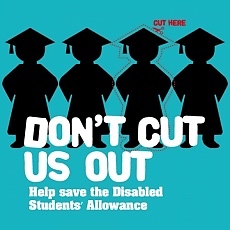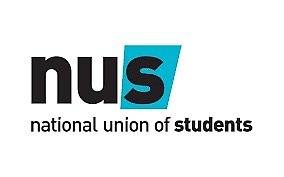Education3rd December 2015
Cuts to Disabled Student's Allowance will especially disadvantage Deaf students
There are fears easier options around withdrawing university places might be taken instead
 What do you do when 64,500 disabled higher education students successfully use a Government Scheme to help them get the most out of their learning opportunity at university? You cut it of course, passing much of the financial responsibility for that support over to the universities under the airy fairy ‘reasonable adjustment’ requirements of the Equality Act. That is the decision taken by Joseph Johnson, the Minister of State for Universities and Science, a decision that was delivered by way of a written statement to the House of Commons yesterday.
What do you do when 64,500 disabled higher education students successfully use a Government Scheme to help them get the most out of their learning opportunity at university? You cut it of course, passing much of the financial responsibility for that support over to the universities under the airy fairy ‘reasonable adjustment’ requirements of the Equality Act. That is the decision taken by Joseph Johnson, the Minister of State for Universities and Science, a decision that was delivered by way of a written statement to the House of Commons yesterday.
A previous Government made a name for itself by using ‘big news days’ to announce questionable Government decisions, and it seems this Tory Government did just the same yesterday when passing its sentence on the future of the Disabled Student’s Allowance (DSA).
 A knowledgeable view on the success of the Equality Act so far in respect of the Deaf community, will contend that the decision to withdraw elements of the DSA is based more on hope for the future decision making of universities than of expectation. There can be little doubt that many fights lie ahead for Deaf students because they just became a cost to universities, not an income stream.
A knowledgeable view on the success of the Equality Act so far in respect of the Deaf community, will contend that the decision to withdraw elements of the DSA is based more on hope for the future decision making of universities than of expectation. There can be little doubt that many fights lie ahead for Deaf students because they just became a cost to universities, not an income stream.
 Natasha Hirst, the Ex National Union for Students in Wales President and Disabled Student’s Officer at Cardiff University, who received the DSA during her chemistry degree because she is Deaf commented on the Government decision, “Good practice for supporting disabled students varies hugely across universities. Placing sole responsibility on universities for providing DSA and access provision will place disabled students at risk of not having their access needs met and jeopardising their ability to complete their studies.”
Natasha Hirst, the Ex National Union for Students in Wales President and Disabled Student’s Officer at Cardiff University, who received the DSA during her chemistry degree because she is Deaf commented on the Government decision, “Good practice for supporting disabled students varies hugely across universities. Placing sole responsibility on universities for providing DSA and access provision will place disabled students at risk of not having their access needs met and jeopardising their ability to complete their studies.”
 “This could especially disadvantage deaf students who require communication support due to actual or perceived higher costs involved in providing that support. If universities are responsible for funding all support, this could lead to deaf students being discriminated against during the admissions process in an effort to avoid extra costs of providing support.”
“This could especially disadvantage deaf students who require communication support due to actual or perceived higher costs involved in providing that support. If universities are responsible for funding all support, this could lead to deaf students being discriminated against during the admissions process in an effort to avoid extra costs of providing support.”
The Government decision comes during difficult financial times, but an upturn in the country’s financial prospects has seen the Government make radical changes to some of its plans in recent weeks.
 Simon Deacy OBE, the owner of PJS Speakers Ltd, a company promoting paralympian athletes for motivational talks, told me, “The decision is extraordinary and potentially very damaging. The DSA has been far from perfect, but the jump in the numbers of disabled students accessing support from 47,400 in 2009/10 to 64,500 in 2012/13 shows how this grant has been instrumental in recent years in opening up university education to many more disabled students. We should be celebrating that and building on the success. That open door to better life prospects for disabled people has just been slammed firmly in some of their faces, with many disabled students now at the mercy of the financial departments of our universities.”
Simon Deacy OBE, the owner of PJS Speakers Ltd, a company promoting paralympian athletes for motivational talks, told me, “The decision is extraordinary and potentially very damaging. The DSA has been far from perfect, but the jump in the numbers of disabled students accessing support from 47,400 in 2009/10 to 64,500 in 2012/13 shows how this grant has been instrumental in recent years in opening up university education to many more disabled students. We should be celebrating that and building on the success. That open door to better life prospects for disabled people has just been slammed firmly in some of their faces, with many disabled students now at the mercy of the financial departments of our universities.”
Mr Johnson rightly points out in his Commons statement that, “DSAs currently provide a range of support. This includes the purchase of specialist equipment, provision of support workers and assistance with additional travel costs.” The cost of that provision was £145.8 million in 2012/13. Are we seriously expected to believe that universities will pick up a sizeable chunk of that tab when these changes are fully put in place in 2016/17.”
 I agree wholeheartedly with the Minister when he says that Higher Education establishments have to take more seriously their obligations under the Equality Act. That is particularly in respect of their actions to better support disabled students, and their disabled staff for that matter, but the decision to cut the DLA is simply abdicating responsibility for disabled students who need certain types of support and seemingly not to care whether they do go on to have that support in due course.
I agree wholeheartedly with the Minister when he says that Higher Education establishments have to take more seriously their obligations under the Equality Act. That is particularly in respect of their actions to better support disabled students, and their disabled staff for that matter, but the decision to cut the DLA is simply abdicating responsibility for disabled students who need certain types of support and seemingly not to care whether they do go on to have that support in due course.
The Minister himself says that, “It is for HE (Higher Education) providers to consider how they make both anticipatory reasonable adjustments and also reasonable adjustments at an individual level,” a statement which might as well have said, ‘there will be a post code lottery in respect of the extent to which universities will meet their Equality Act obligations’.
The changes will apply to all full-time, full-time distance learning, part-time and postgraduate students applying for DSAs for the first time in respect of an academic year beginning on or after 1 September next year. Existing DSA students and DSA students for 2015/16 will remain on their existing system of support for 2016/17.
 Susan Daniels, Chief Executive of the National Deaf Children’s Society, said: “We are bitterly disappointed that the government has announced it will cut disabled students’ allowance, which is a lifeline for so many deaf students at university.”
Susan Daniels, Chief Executive of the National Deaf Children’s Society, said: “We are bitterly disappointed that the government has announced it will cut disabled students’ allowance, which is a lifeline for so many deaf students at university.”
“We know that deaf students can achieve just as much as their hearing peers, but the right support must be in place. As it stands, we have no way of knowing if universities will pick up the cost of vital support staff. Deaf students desperately need support such as note-takers because they cannot lip-read a lecturer or follow a sign language interpreter and take notes at the same time.”
“Deaf young people are telling us they feel the government is intent on making it more difficult for them to go to university. We strongly believe the government must think again or guarantee safeguards will be in place to protect deaf students.”
 What the changes mean, is that from next September, universities are expected to pay for non-medical support staff, including note-takers, and readers, and funding for computer equipment and specialist accommodation will be reduced. In reality, that will lead to disabled students being looked at differently and I expect to see a reduction in the number of disabled students entering higher education as a direct consequence of the Minister’s decision. I hope I am proved to be wrong.
What the changes mean, is that from next September, universities are expected to pay for non-medical support staff, including note-takers, and readers, and funding for computer equipment and specialist accommodation will be reduced. In reality, that will lead to disabled students being looked at differently and I expect to see a reduction in the number of disabled students entering higher education as a direct consequence of the Minister’s decision. I hope I am proved to be wrong.
Article by Sarah Lawrence, Editor
posted in Community / Education
3rd December 2015





